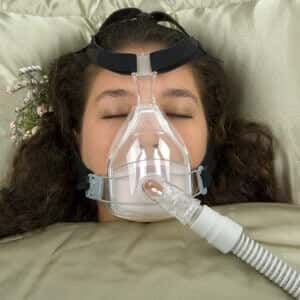
People who suffer from obstructive sleep apnea (OSA) often snore. That’s because the airway is obstructed during sleep. When air flows past relaxed tissues in the throat, they vibrate. That leads to snoring. Even worse is the breathing disorder itself. It can lead to lots of health problems. Doctors often prescribe a continuous positive airway pressure (CPAP) device to open airways. One reader tells us that CPAP lowered cholesterol levels! Another found that it cured insomnia.
CPAP Lowered Cholesterol and Improved Sleep:
Q. My doctors have been urging me for years to take cholesterol-lowering drugs. I have not taken them because I did not want to risk their adverse side effects.
Last year, my cholesterol levels improved dramatically without drugs or diet change. That was despite reduced physical activity.
In November 2019, my total cholesterol was 224 and my LDL was 165. Triglycerides were 94. My “good” HDL was 62.
In October 2020, I had total cholesterol of 198 and LDL of 117 and triglycerides of 121. My HDL cholesterol was 63.
Last week my numbers continued to look good. My total cholesterol was 199 and my “bad” LDL was 124. Triglycerides were the lowest yet at 63. My good HDL levels were up to 70.
The only life change I made was to begin using a CPAP machine. Before the CPAP use, I was averaging 30+ sleep apnea events per hour during the night. The CPAP significantly reduced the events per hour. For the past year, I have averaged less than two events per hour.
In a search of the Internet, I found a European study that linked sleep apnea events to cholesterol levels. Have you seen research supporting the proposition that reducing sleep apnea events can reduce cholesterol levels? I think CPAP lowered cholesterol in my case.
A. To our surprise, we were able to find a longitudinal pilot study that showed CPAP users had lower total cholesterol and LDL levels for up to five years (Journal of Sleep Research, April 2020). Here is what the authors write about their findings:
“In this study, we demonstrated that application of CPAP therapy for as short as 2 months reduced fasting TC [total cholesterol] and LDL-C levels in a cohort of patients with severe OSA [obstructive sleep apnea]. Importantly, the beneficial effect of CPAP was not transient, and was sustained even after 5 years of therapy, indicating that CPAP improves the lipid profile of patients with OSA over the long term, potentially ameliorating the risk of cardiovascular disease associated with OSA.”
Why CPAP Lowered Cholesterol: A Hypothesis:
The authors go on to suggest that:
“The mechanism by which CPAP improves lipid metabolism is unclear. It can be speculated that a decrease in oxidative stress or elimination of intermittent hypoxia [low oxygen levels in blood], sympathetic hyperreactivity [excessive adrenaline] and sleep fragmentation are indirectly involved in the process.”
We suspect that there’s something to this hypothesis. When the people stop breathing for a few seconds (or sometimes longer), it puts a strain on the system. That is called “sympathetic hyperreactivity.” The body is under stress and it is probably not good for lipid levels.
Does Sleep Apnea Interfere with Sleep?
Q. Years ago, I had huge problems getting a good night’s sleep. When my doctor ordered a sleep study, I was informed that my breathing stopped around 25 times an hour! The diagnosis was sleep apnea, even though I was young, thin and didn’t snore.
A CPAP machine changed my life. I would encourage folks with persistent insomnia to ask about a sleep study.
A. Untreated obstructive sleep apnea can lead to health problems such as high blood pressure or diabetes as well as fatigue. (Keep reading for more about fatigue.) The usual treatment is, as you have outlined, continuous positive airway pressure. This is delivered through a CPAP machine that simply doesn’t let you stop breathing. A sleep doctor can also prescribe other options such as lifestyle changes or oral devices.
Why Obstructive Sleep Apnea Is Harmful:
The symptoms of OSA include exhaustion during the day. Friends with obstructive sleep apnea report constant fatigue and overwhelming daytime sleepiness. Many people also experience difficulty concentrating and brain fog. Irritability and depression may also be associated with OSA. Another complication is high blood pressure. As you just read, high cholesterol could also be linked to OSA.
If a partner complains about your snoring, maybe it’s time to see a health professional! You can learn more about how to overcome sleep problems by listening to Show 1393: How to Get the Sleep You Need.
Citations
- Simon, B., et al, "Effect of 5-year continuous positive airway pressure treatment on the lipid profile of patients with obstructive sleep apnea: A pilot study," Journal of Sleep Research, May 26, 2019, https://doi.org/10.1111/jsr.12874

